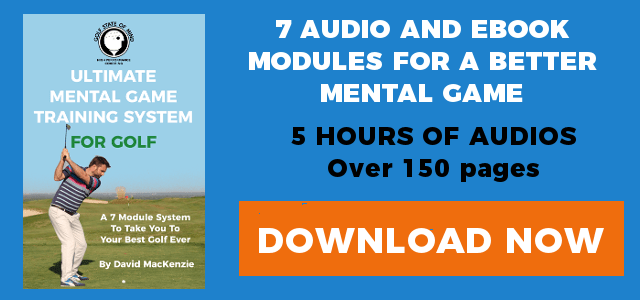Being “in the present” is so important in golf. It frees up your mind, allowing you to access to your best skills. The ancient practice of meditation and mindfulness is all about improving a person’s ability to access the present moment and be accepting of how they feel in that moment without trying to change it. This creates freedom in your mind and body and makes higher performance more possible. The challenge we all face today is being constantly distracted by checking our mobile devices – nobody spends much time in the present at all.
I advise all my students to start a daily practice of meditation and mindfulness, as it has so many benefits (beyond golf). With this practice you will become more able to clearly focus on the things that are most important, and reduce the noise from those things that are not.
Samurai Warriors adopted Zen Buddhism and meditation because it allowed them to fight with an “empty mind”. For these swordsman, having an empty mind was vital in the midst of combat as it freed them from doubt, fear and focus on technique. Of course they trained technique, but when combat began, all thinking departed and the purity of the action took over.
Being in the present, is when your attention (focus) isn’t on what’s happened or what will happen (consequences), only on what’s happening now, e.g. your pre-shot routine or your walk in between shots.
In between shots, direct your focus of attention to your breathing and what you see and feel (the trees, sky, surrounding landscape, the wind, the ground beneath your feet etc.). This will bring you to the present – you are alert and aware but not thinking.
It’s also a perfect way at any time to come out of negative emotions, regret, anger, anxiety – fear is always ‘future’. Excitement suggests thinking about results, regret suggests past mistakes, instead, just keep playing the shot in hand until they run out.
Here’s an exercise for you…
Ask yourself “I wonder what my next thought will be?” and ‘notice’ how long it is before a thought comes in. Keep practicing until you can extend that time to several seconds or more.
If it’s easier, focus on something, a glass, a golf ball, your breath etc. (be very specific e.g. the light sparkling off one dimple of the golf ball). Now hold your attention and see how long it is before a thought comes in, then notice if your mind drifts, and if it does, gently bring it back. Practice, daily at first, then often to maintain the skill.
Being “Mindful” Of Your Thoughts and Emotions
Emotions come from thoughts. When your mind is quiet, you can become better at observing your thoughts and emotions, without reacting to them and giving them more power. It’s the resisting and reacting that causes performance-limiting anxiety.
With practice, your inner voice can be listened to impartially, without judgement and reaction – you just gently bring your attention back to what’s happening now. One day you’ll catch yourself smiling at this inner voice!
With practice you’ll be able to play with less emotion and more focus on what’s going to help you most.
If you’re truly present you won’t be evaluating how you’re playing or keep a running total, or be thinking ‘if only’. Instead, you’ll be quietening your mind and accessing the “Golf State of Mind”. How to meditate and be more mindful is covered in a section in my Ultimate Mental Game Training System, but you can start today by spending some quality time without your mobile device…



